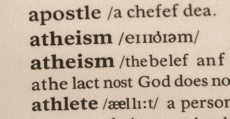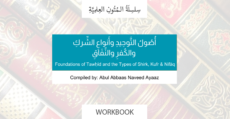Reference: Treatise – Arba’ Qawaa’id tadoor al-Ahkaam ‘alayhaa
In the name of Allaah, the Most Merciful, the Bestower of Mercy
These four principles are from the fundamental principles of the religion, the laws [of the religion] are based upon them. They are the greatest of blessings that Allaah (the Most High) has blessed Muhammad (sal Allaahu alayhi wa sallam) and his Ummah.
He made their religion perfect and comprehensive; more encompassing and knowledge based than the other religions. Allaah (the Blessed and Most High) combined all this for [the followers of Islaam], in very little words. This is something that should be paid attention to before knowing the four principles.
You should know the statement of the Prophet (sal Allaahu alayhi wa sallam), when he mentioned to us that he had [certain qualities] that Allaah exclusively chose for him over the other Messengers, he wanted from us to know this blessing of Allaah and show gratitude to Him. He said, when he mentioned, the exclusive qualities:
I have been given Jawaami’ al-Kalim [1]
The Imaam of Hijaz, Muhammad ibn Shihaab az-Zuhree said: “Its meaning is that Allaah gave him [the ability] to communicate deep meanings with little words.”
The First Principle: The prohibition of speaking about Allaah without knowledge.
This is due to His saying (the Most High)
{Say, “My Lord has only forbidden immoralities…}
to His saying
{…and that you say about Allah that which you do not know} [07:33]
The Second Principle: Every matter that the Legislator remained silent over, is a pardon.
It is not permitted for anybody to prohibit, obligate, recommend or dislike [what Allaah remained silent over].
This is due to His saying (the Most High),
{O you who have believed, do not ask about things which, if they are shown to you, will distress you} [05:101]
The Prophet (sal Allaahu alayhi wa sallam) said,
He [Allaah] remained silent over matters as a mercy upon you, not due to forgetfulness; so do not ask regarding those matters [2]
The Third Principle: To leave the clear evidences and what they prove due to other ambiguous [proofs]
This is the way of the people of deviation, like the Raafidhah and Khawaarij.
The Most High said,
{As for those in whose hearts is deviation [from truth], they will follow that of it which is ambiguous} [03:07]
The obligation upon a Muslim is to follow the clear direct evidences; if a person knew the meaning of the ambiguous proofs, he would realise that they do not contradict the clear evidences, rather agree with them.
In all cases, it is obligatory to follow the scholars of deep knowledge, in their saying:
{We believe in it. All [of it] is from our Lord} [03:07]
The Fourth Principle: [The doubtful matters]
The Prophet (sal Allaahu alayhi wa sallam) mentioned,
The Halaal (Permitted Matters) are clear; the Haraam (Prohibitted Matters) are clear; and between them are doubtful matters [3]
So whoever does not understand this principle with intelligence, and yet speaks decisively then indeed he has become misguided and misguides others.
[Conclusion]
The [first] three principles were mentioned by Allaah in His Book, and the fourth was mentioned by the Prophet (sal Allaahu alayhi wa sallam)
Know, may Allaah have mercy upon you, that these four statements, despite their concise nature, the religion is based upon them. [these four principles] apply, regardless of whether a person is speaking about the knowledge of Tafseer, Principles of Creed or the knowledge of the actions of the heart. [4]
Footnotes
[1] Narrated by Jaabir Ibn Abdullah; Collected by Saheeh Bukhaaree
[2] Narrated by Abu Tha’labaal-Khushani; Collected by Daraqutni
[3] Narrated by Nu’maan Ibn Basheer; Collected by Bukhaaree & Muslim
[4] This treatise is a sub-treatise of a bigger compilation. The Full Arabic treatise can be read: http://d1.islamhouse.com/data/ar/ih_books/single2/ar_Four_rules_of_going_under_the_provisions.pdf
أربع قواعد تدور الأحكام عليها
المرجع: أربع قواعد تدور الأحكام عليها ويليها نبذة في اتباع النصوص مع احترام العلماء
هذه أربع قواعد من قواعد الدين التي تدور الأحكام عليها وهي من أعظم ما أنعم الله تعالى به على محمد صلى الله عليه وسلم وأمته، حيث جعل دينهم دينا كاملا وافيا أكمل وأكثر علما من جميع الأديان، ومع ذلك جمعه لهم سبحانه وتعالى في ألفاظ قليلة وهذا مما ينبغي التفطن له قبل معرفة القواعد الأربع
وهو أن تعلم قول النبي صلى الله عليه وسلم لما ذكر لنا ما خصه الله به على الرسل يريد منا أن نعرف نعمة الله ونشكرها. قال لما ذكر الخصائص: ((وأعطيت جوامع الكلم))
قال إمام الحجاز محمد بن شهاب الزهري: معناه أن الله يجمع له المعاني الكثيرة في ألفاظ قليلة:
القاعدة الأولى: تحريم القول على الله بلا علم:
لقوله تعالى:
{قُلْ إِنَّمَا حَرَّمَ رَبِّيَ الْفَوَاحِشَ}
إلى قوله:
{وَأَنْ تَقُولُوا عَلَى اللَّهِ مَا لا تَعْلَمُونَ}
القاعدة الثانية: أن كل شيء سكت عنه الشارع فهو عفو لا يحل لأحد أن يحرمه أو يوجبه أو يستحبه أو يكرهه
لقوله تعالى:
{يَا أَيُّهَا الَّذِينَ آمَنُوا لا تَسْأَلوا عَنْ أَشْيَاءَ إِنْ تُبْدَ لَكُمْ تَسُؤْكُمْ}
قال النبي صلى الله عليه وسلم: ((وسكت عن أشياء رحمة بكم غير نسيان، فلا تسألوا عنها))
القاعدة الثالثة: أن ترك الدليل الواضح والاستدلال بلفظ متشابه هو طريق أهل الزيغ كالرافضة والخوارج
قال تعالى:
{أَمَّا الَّذِينَ فِي قُلُوبِهِمْ زَيْغٌ فَيَتَّبِعُونَ مَا تَشَابَهَ مِنْهُ}
والواجب على المسلم اتباع المحكم، وإن عرف معنى المتشابه وجده لا يخالف المحكم بل يوافقه، وإلا فالواجب عليه اتباع الراسخين في قولهم:
{آمَنَّا بِهِ كُلٌّ مِنْ عِنْدِ رَبِّنَا}
القاعدة الرابعة: أن النبي صلى الله عليه وسلم ذكر: ((أن الحلال بيِّن والحرام بيِّن وبينهما أمور مشتبهات))
فمن لم يفطن لهذه القاعدة وأراد أن يتكلم على مسألة بكلام فاصل فقد ضل وأضل.
فهذه ثلاث ذكرها الله في كتابه والرابعة ذكرها النبي صلى الله عليه وسلم. واعلم رحمك الله أن أربع هذه الكلمات مع اختصارهن يدور عليها الدين، سواء كان المتكلم يتكلم في علم التفسير أو في علم الأصول أو في علم أعمال القلوب



